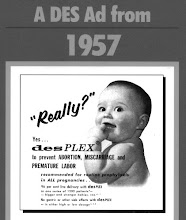 Media Alert
Media Alert
23rd May 2011
740,000 Australians must ask their mother a lifesaving question
Health risks go undetected as local residents could be exposed to DES
Australian women and men are being urged to ask their mothers and grandmothers if they were prescribed the anti-miscarriage drug DES (diethylstilboestrol or "stilboestrol") as part of this year's DES Awareness Week (June 1-7). This year marks the 40th anniversary of the first DES linked cancer finding, and yet there are up to 740,000 Australians affected by this drug, many of whom are still unaware of their exposure and its health risks.
Asking this one simple question could save lives. Many Australians still have not heard about DES, an anti-miscarriage drug prescribed in good faith to pregnant women between 1940 and 1971 (and sometimes beyond).
Carol Devine, DES Action NSW coordinator and a DES daughter, says it's time now for openness about DES and for this information to be at the forefront in Australian health promotion.
"We constantly hear from people affected, who have only recently learned their health problems have been attributed to DES. Raising conversation about DES to your family and friends is really important. It will help spread the message of the proper care for DES exposure and could even help save the life of someone close," she said.
Problems first arose with this drug in the 1970s. It is now known to increase risks in certain cancers (breast, cervical and vaginal) and cause reproductive problems in those women given DES and their children of that pregnancy.
Dr Jules Black, DES knowledgeable obstetrician and gynaecologist and medical spokesperson for the DES Action group, urges women, who have health histories suggestive of DES exposure, to seek DES information and to visit their doctors.
"Many people remain unaware of their exposure to DES and yet, it is vital that people affected get the specialised health care they need. If you have experienced recurrent miscarriages, t-shape uterus, ectopic (tubal) pregnancies or infertility, it may be a result of exposure to DES," says Dr Black.
Dr Black advises it is important that DES exposed women get the proper screenings to detect cancers early and women exposed to DES in the womb have "high risk" care during their pregnancies. Women can ask for an assessment of DES exposure probability and possible referral to a DES knowledgeable specialist.
Men exposed to DES in the womb can be affected too, with increased risk of genital abnormalities. They should do self-checks regularly and report anything unusual to their doctors.
The estimation that up to 740,000 DES exposed Australians has been calculated from available data. The government has refused to promote DES information in public health programs due to concern this may create community anxiety. This stance by government underestimates and insults the intelligence of Australians, especially where the community has become more health aware and educated over the past 40 years since the problem with DES was first identified. DES Action NSW has recently taken this matter to the Australian Human Rights Commission.
People can find out about DES at www.desnsw.blogspot.com
The website has a listing of DES knowledgeable health care providers in Australia. Information and support is available by phoning DES Action NSW 02 98754820.
ARE YOU DES EXPOSED?
If you were born between 1938 and 1971 (and in some cases beyond), here is how to find out:
- Ask your mother if she recalls having a previous miscarriage or being given medications while pregnant. DES was most commonly prescribed to prevent miscarriage and for pregnancy complications such as bleeding. It was also known as "stilboestrol". If you are unable to ask your mother, your own health history may offer clues - especially if you have had a series of reproductive problems such as cancer, infertility, or endometriosis. Progesterone, another hormone, may have also been used to prevent miscarriage and research has not shown problems with this. However, if your mother remembers only being given "hormones" during pregnancy, it is worthwhile having a specialist check-up, informing the doctor your mother was given hormones during pregnancy.
- Do your research. If you think you may have been affected by DES, ask your doctor for more information, and visit www.desnsw.blogspot.com
for support and resources. - Be prepared. Taking DES information along to appointments is very helpful, so that health professionals understand that special cancer preventive care for DES exposed women is important and should be life-long.
- You are not alone. In the USA, screenwriter and DES activist, Caitlin McCarthy, only learned of her in utero DES exposure in 2005. She is poignant in her internet message for people to overcome feelings of embarrassment and to start talking about DES. Caitlin can be heard at
- Think about your health. Health problems associated with DES for DES daughters include risk for miscarriage and ectopic (tubal) pregnancy, premature delivery, infertility, and reproductive tract cancers, primarily of the vagina and cervix. DES sons are at increased risk for urogenital conditions such as undescended testes and epididymal cysts (benign growths around the testes).
- Relay this to your health care provider. DES exposure is as important to your health history as conditions like diabetes or heart problems.
- Mark your diary to have your special DES health checks.
- Keep updated and talk to your family about DES. Overseas research about DES is ongoing, so it is important for you and your family to keep informed.
- Seek support if needed
Graphic available
For more information, interviews or personal stories, contact:
Carol Devine
E: c_devine@bigpond.net.au
P: (02) 98754820

No comments:
Post a Comment